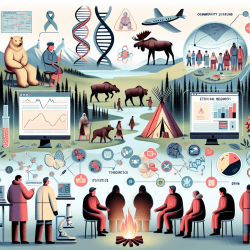Introduction
The field of speech language pathology is continuously evolving, and practitioners are always seeking data-driven insights to enhance their practice. A recent study titled A Retrospective Analysis of the Gender Trajectories of Youth Who Have Discontinued a Transition provides valuable insights into the complex journeys of youth who have detransitioned. This blog aims to help practitioners improve their skills by understanding the outcomes of this research and encouraging further exploration.
Key Findings
The study conducted by Pullen Sansfaçon et al. (2023) highlights the nonlinear and diverse experiences of youth who have detransitioned. The research draws from 20 in-depth interviews with young people aged 16 to 25, focusing on three key dimensions: gender modalities, sexual modalities, and dysphoria experiences.
- Nonlinear Gender Modalities: The study found that gender trajectories are not linear. Youth often navigate through various gender identities and expressions throughout their journey, challenging the binary norms.
- Navigating Sexual Modalities: Changes in gender modalities often coincide with shifts in sexual modalities, indicating a fluid and evolving understanding of sexual identity.
- Coping with Dysphoria: Experiences of dysphoria and body discomfort are complex and multifaceted, often intertwined with mental health issues and societal pressures.
Implications for Practitioners
For practitioners working with youth in transition or detransition, this study underscores the importance of adopting a holistic and individualized approach. Here are some key takeaways:
- Embrace Nonlinearity: Recognize that gender journeys are not linear. Be open to diverse experiences and identities, and avoid imposing binary norms.
- Support Exploration: Encourage youth to explore their gender and sexual identities without pressure to conform to societal expectations.
- Address Mental Health: Pay attention to the mental health aspects of dysphoria and body discomfort. Provide support for coping strategies and mental health resources.
- Foster Inclusive Environments: Create safe and inclusive spaces for youth to express their identities and experiences without judgment.
Encouraging Further Research
This study opens up avenues for further research into the complex experiences of youth who detransition. Practitioners are encouraged to delve deeper into the factors influencing detransition and explore the broader implications for practice. By contributing to the body of research, practitioners can help shape more informed and supportive interventions for youth.
Conclusion
The findings from this study provide valuable insights into the diverse and nonlinear gender journeys of youth who have detransitioned. By understanding these complexities, practitioners can better support youth in their gender exploration and provide more effective interventions. To read the original research paper, please follow this link: A retrospective analysis of the gender trajectories of youth who have discontinued a transition.










